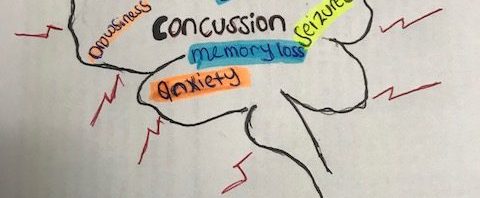Injuries can happen at any given time in a person’s life. Whether you are riding a bike, walking a dog, playing a sport or even going downstairs in your basement (trust me this actually happened to me) some of them happen spontaneously while others can be controlled. The severity of an injury to a part of a body, whether an ankle, knee, shoulders or back can lead to minor or major implications to that part of the body. Restricting movement and ability for a person to do things they used to do freely. When a person hits their head, several things might happen. They might get a cut, a headache or even a concussion, which would qualify as most severe.

Concussions were once thought to cause short term effects only but as technology and research improved, we now know that concussions can lead to long term effects, especially when a player/person sustains several of them. In fact, high-impact concussions have been linked to a degenerative brain disease called chronic traumatic encephalopathy, or CTE.
Most sports team trainers will tell you three concussion are too many, there is no evidence that proves that three concussions are the deal breaker. In fact one concussion can be just as severe and damaging to a person’s brain as three. The severity of the concussion depends on how hard the point of impact was and the person themselves.
The severity of one’s symptoms can convey how bad the concussion is. Symptoms like:
- difficulty thinking and concentrating (cognitive)
- difficulties interpreting movement and balance problems (vestibular)
- issues with vision and ocular-motor function (ocular)
- migraine
- neck pain
- anxiety and changes in mood
Concussion and the brain
There are a few things that happen when a person gets a concussion or after one. Besides the obvious symptoms, other things happen in the brain. The two main things are:
- Ionic flux and Glutamate release: injury to the brain causes ionic flux and hyperacute glutamate to release. This then triggers voltage or ligand gated ion channels, which lead to depression-like state.
- Energy crisis: in an effort to restore ionic and cellular balance, ATP- requiring membrane ionic pump shift into overdrive, leading to an increased demand of glucose( energy), relative depletion of intracellular energy reserves, and increase in ADP.
- OTHER complications are. Cytoskeletal damage, Axonal dysfunction, altered neurotransmission and Cell death.
What can I do to recover?
- Rest your brain
- Reduce physical and mental demands
- Use strategies for your thinking problems
- Take care of your basic needs
- Resume exercise and sports gradually
- Get your doctors approval for driving
- Resume work or school gradually Prevent a 2nd, 3rd…or 4th concussion
Studies show athletes who continue to play following a sport-related concussion double their recovery time. Not only that, but they also tend to have worse symptoms, and more significant impairment in the aftermath. There’s also the potentially-fatal second impact syndrome, which occurs when an already-damaged brain gets hit again and swells up dramatically in response. That sudden change is often deadly, and those who survive spend the rest of their lives severely disabled.
As an athlete who has had multiple concussions the biggest advice I would give to you, is to listen to your body. If you feel like you are not 100% do not return. Just like any other injury on any body part, if you don’t let it heal the body part will never be same. And this might apply to the brain as well.
https://www.youtube.com/watch?v=tgChTeALF7g
